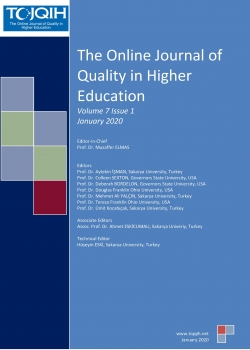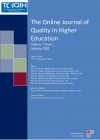TOJQIH - Volume 7 - Issue 1 - January 2020
 IMPROVING GROUP/TEAM ASSESSMENTS IN TECHNICAL EDUCATION: AN EMPIRICAL EXPERIMENT
IMPROVING GROUP/TEAM ASSESSMENTS IN TECHNICAL EDUCATION: AN EMPIRICAL EXPERIMENT IMPROVING GROUP/TEAM ASSESSMENTS IN TECHNICAL EDUCATION: AN EMPIRICAL EXPERIMENT
Abstract:
In the technical curriculum in general and in engineering curriculum in particular. most of the modules have group work for their projects/coursework. Group work plays an important role in team building, confidence and interpersonal skills and makes them fit from the industry perspective. As a teacher and assessor it becomes a challenge to assess the group work as a whole or on an individual basis as most of the time individual contribution of the student towards the project is unknown. The action research project focused on strategy and approaches to improve the group work assessment by implementing a rubric which consist of individual accountability of each student in a group work.
From the overall group work project evaluation it was seen that the action research project on the group work has helped the students to develop transferable skills, teamwork skills and social interactions as well as learning about beliefs and attitudes. Also the students agreed that their leadership skills increased which is imperative requirement of any industry. The curriculum product and process model along with constructive alignment theory has made students achieve their outcomes easily for their group work process.
 INVESTIGATION OF COMMUNICATION SKILLS OF GIFTED STUDENTS IN TERMS OF VARIOUS VARIABLES
INVESTIGATION OF COMMUNICATION SKILLS OF GIFTED STUDENTS IN TERMS OF VARIOUS VARIABLES Ahmet ESKÄ°CUMALI, Naif KARA, Serhat ARSLAN, Kadriye UZUN
Abstract:
The aim of this study is to examine the communication skills of gifted students in terms of various variables in order to form a program model to support their interpersonal communication skills. After determining the interpersonal communication skills of the students in Science and Art Center (BÄ°LSEM), it is aimed to improve the communication skills of these gifted students by applying programs that support the communication skills. The quantitative part of the study was applied to a total of 338 gifted students aged between 13 and 18 years through a scale adaptation to determine communication skills. The 23-item 6-dimensional model was found to be consistent in confirmatory factor analysis. As a result of the study, the scale was found to be reliable and valid. According to the findings, a significant difference was found in communication skills of gifted students according to gender and school type. There was no significant difference according to grade level.
 NON-PARAMETRIC VALUE-ADDED OF TVET HIGHER EDUCATION INSTITUTIONS IN CHILE
NON-PARAMETRIC VALUE-ADDED OF TVET HIGHER EDUCATION INSTITUTIONS IN CHILE Claudia P. Ovalle RamĂrez
Abstract:
DEA (data envelopment analysis) was used to explore the efficiency of IP and CFT institutions that provide technical and vocational training in Chile. Several inputs and outputs were included: years of accreditation (quality certification), total assets of the IP/CFT, total student enrollment, percentage of former high school students coming from public schools, charter schools, and private schools, teachers´ years of education, total number of teachers, and the infrastructure in squared meters (m2). Results indicate that 15 out of 27 CFT institutions (55%) and 12 out of 31 IP institutions (38,7%) are efficient. On the other hand, 12 CFT institutions out of 27 (45%) and 19 out of 31 IP are inefficient (61,3%). There is no correlation between the accreditation awarded by the CNA (National Accreditation Commission) and the efficiency measures obtained with DEA Analysis suggesting the need to establish a measurement of quality for TVET (technical and vocational) institutions in Chile.
 TEAM FORMATION AND GROUPING PROBLEM FOR GRADUATION PROJECTS
TEAM FORMATION AND GROUPING PROBLEM FOR GRADUATION PROJECTS Dyek Chungwang Michael, Nidai Kordal, Benjamin Mukadi
Abstract:
The aim of this study is to develop an assignment system for Graduation Project Group Formation (GPGF). In the Faculty of Engineering, Cyprus International University (CIU), students from different departments are forming interdisciplinary project groups depending on the requirements of the proposed project. Current assignment method is causing problems like students can be assigned to project where their knowledge on specific courses required by that project is very limited or the ones that they don’t want to study. These two reasons can decrease the quality of the project. Another problem is the group setup, where the attitude of the students and their personal characteristics affects the performance of the team. In this study, an assignment methodology is being designed, which considers students characteristics (behavior) and academic performance to achieve team harmony and improve quality of the graduation projects. An assignment algorithm is formulated for assigning students to the graduation projects.
 THE IMPORTANCE OF RISK MAPPING IN OPEN AND DISTANCE LEARNING: A CONTEPTUAL FRAMEWORK FOR MEGA UNIVERSITIES
THE IMPORTANCE OF RISK MAPPING IN OPEN AND DISTANCE LEARNING: A CONTEPTUAL FRAMEWORK FOR MEGA UNIVERSITIES Emre Dinçer, Gülsün Meriç, Seval Kardeş Selimoğlu
Abstract:
Open and Distance Learning (ODL) is the learning environment for digital natives who were born and grew up
in digital landscape. As ODL is dependent on technology, it can't be deprived of the risks that lightning fast
developing new technologies pose. Every new technology comes along with new risks that have to be managed
within the scope of ODL environment. Risk mapping is a risk analysis tool that visualize the risks that can be
found out during initial planning phase of risk management process. It is usually presented with a two-
dimensional matrix that helps defining the risks. This study aim to show usefulness of risk mapping for ODL
institutions, especially in mega universities.


